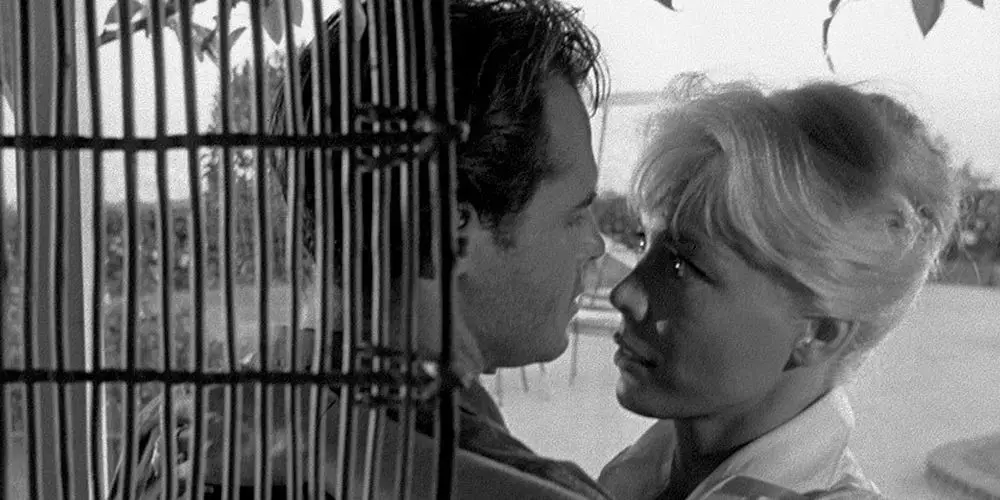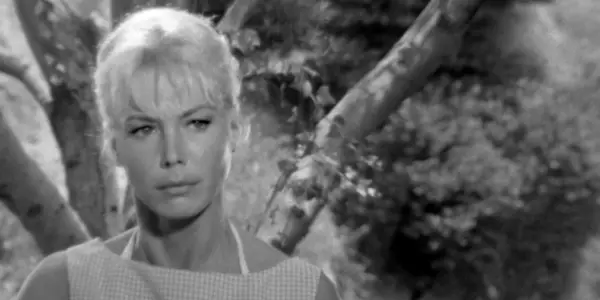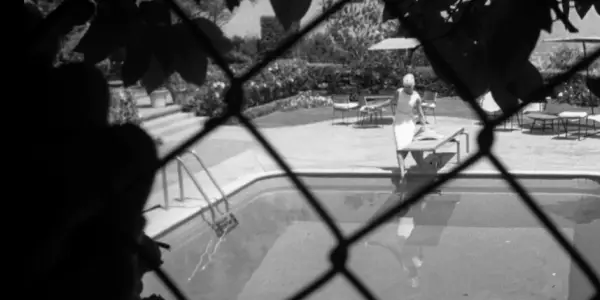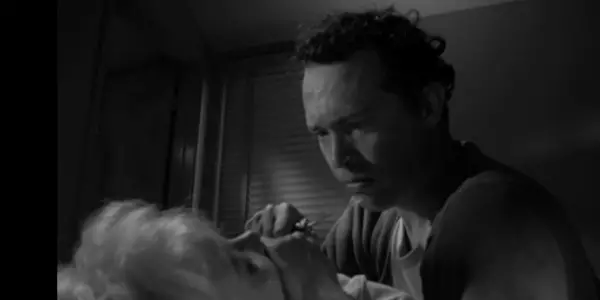PRIVATE PROPERTY: Old School Voyeurism

Alex is a 28 year-old West Australian who has a…
When it comes to cinema, it is truly the best and the worst of times. An unstable economy and the rampant rise of piracy have forced studios to rehash old films and hammer original ideas into the ground just to try and make money, with many mainstream movies now catering towards the profitable Chinese market to make those big bucks that the US haven’t been producing lately.
Whilst it’s a dire situation, this new social media age has been a huge step forward in retaining and reviving film history. Tons of websites and companies have the aim to keep the memory of old school cinema alive in a time where film is treated so disposable due to its digital nature.
A good point to make is that despite our access to films being greater (through VOD, DVD, Bluray, etc), the range of those films is growing narrower, with each new medium introduced slowly thinning out the spectrum of films obtainable. There are hundreds of films that are VHS only, that have still not made the transition from VHS to DVD, or from DVD to Bluray or VOD.
This is mostly due to lack of financial incentive for distribution companies or complications with copyright issues. That’s why its always so heartwarming to see so many little film distribution companies emerging that drag classic cinema into the modern era. Twilight Time, Scream Factory, Vinegar Syndrome and Cinelicious Pics are just some of the great companies that are part of this home media movement.
Lost Property
Cinelicious Pics have managed to save Private Property, a previously lost independent film from 1960, from the clutches of a bygone period. Private Property’s small reputation comes from it featuring the first leading role in a feature film for legendary character actor Warren Oates (although he had a small role in The Rise and Fall of Legs Diamond that same year).
Restored with the help of UCLA, Private Property is a low budget delight, essentially a three-hander play exploring human sexuality, class welfare and the subtle shift in senseless crime – a shift which would climax in the mainstream knowledge of the Charles Manson murders.

Directed by Leslie Stevens (who would go onto to create the hugely influential sci-fi series The Outer Limits), this film was produced for only $60,000 and shot in just 10 days, with Stevens’ own house used for the main shooting location.
Due to the film’s Hays Code-pushing content, the film failed to receive any firm distributor as no one wanted to release an unrated film. Nonetheless, the film was eventually released and was actually quite a big hit, making $2 million worldwide, mostly thanks to European sales. Even with this success, the film’s lack of proper distribution meant that the film was never properly stored or archived, meaning that for decades after its release, the film was considered lost.
Watching the film in retrospect, it’s not nearly as controversial as its reputation that precedes it. But for the time it was made, the film touches on some racy issues and goes into much darker territory than any Hollywood film of the time.
Smart, Seductive and Menacing
Private Property opens with our two offending protagonists, the slick yet unstable Duke (Corey Allan, most known from Rebel Without A Cause) and his slow-witted but dangerous partner Boots (Warren Oates). They ambiguously emerge from the ocean, immediately entering a beach-side petrol station and extorting the owner for free goods.
This frank introduction instantly informs the audience that whilst these men are our protagonists, they are degenerates up to no good. Whilst the film hints at Boots possibly being gay (one of the film’s more controversial details), Duke is determined in getting Boots together with a female partner, no matter what.
After spotting an attractive woman passing through the gas station, Duke and Boots threaten an innocent appliance salesman into tailgating the young woman back to her rich estate. Upon arrival, the men creepily watch her from the neighbour’s currently vacant house, deciding when and how to approach the seemingly lonely housewife.
Using his blue collar charm, Duke introduces himself to the housewife, Ann (Kate Manx, Leslie Steven’s wife at the time of shooting) She is quite taken by the down-trodden man. Ann is currently married to Roger (Robert Ward), a busy insurance salesman whose heavy work ethic is currently pushing Ann to feel isolated and unloved. It’s a perfect setup to allow the reptilian Duke to make his move.
The film is smartly set up as a simple seduction story, something you’d see in a typical Mills & Boon novel. However, it’s layered with a simmering undercurrent of dread (introduced by the film’s witty opening). As Duke’s seduction starts to become more forceful and unsettling, the atmosphere grows more alarming, ending in a climax that cleverly pays off the film’s various atmospheric and character setups.

This film has all the elements to be a forgettable trashy pulp story, the kind that would fill matinees back in the day just to keep the kids occupied whilst they skipped school. Even with his small budget and low-key story, Stevens’ and his cinematographer Ted McCord (a three time Oscar nominee, his most prominent work being The Sound of Music) make their little film look big.
They implemented some creative camera movements that aren’t too flashy. McCord allows the cinematography to reflect the shift from jovial friendliness into nihilistic chaos, highlighting the power of black and white photography when properly used. As Boots and Duke stalk Ann, peering through wired fences and wide windows, McCord manages to capture the creepiness of the two men’s dangerous voyeurism.
It’s done in a way that feels uncomfortable, rather than provocative. These voyeuristic shots are reminiscent of the works of Brian De Palma, the iconic auteur who has explored different visual ways to convey this darker side of human observation.
The only negative aspects about the film are simple in nature and mostly stem from the film’s low budget short-comings. The film’s soundtrack is largely forgettable, a series of trumpet-laden suspense beats that are quite predictable and give a basic sense of the mood of each scene.
Furthermore, the narrative’s second act is a bit slow, as it mainly consists of Duke planning and methodically courting Ann. It is a lot of small talk and mild conversations, but it’s understandable that these scenes are necessary in making the build-up towards danger seem organic. Lastly, some of the film’s self-censoring (WTF becomes What the Flop) might irk those who are used to modern-day film aesthetics, as these elements come off as more comical than they were originally intended.
The Power of Acting
Warren Oates completionists will be quite pleased with this picture, as the film demonstrates his natural acting abilities, giving a sympathetic depiction of the foolish Boots. The main dynamic between Boots and Duke is an engaging combination of two different types of evil. Duke is an intelligent crook who uses his looks and observation skills to control and take advantage of those around him. He’s seemingly innocent but not afraid to divert to violence if he doesn’t get his way.
Boots is different due to his naivety, with the controlling Duke being able to control his actions. It often forces Boots to become a willing lackey in their offensive misdeeds. This isn’t just about a pair of friends who are up to no good, this film is centred on a lethal pair of criminals who represent post World War II nihilism: do whatever you need to do to survive, without caring about who you hurt along the way.
As the main lead of the picture, Corey Allen gives a excellent leading performance as Duke, able to shift his demeanour depending on the situation. Whilst Oates went off to have quite a successful career as a character actor, its interesting to see the different path that Allen’s career went.
After this and Rebel Without a Cause, Allen became a full-time television director, directing hundreds of different episodes of many TV Shows that people love. It is pleasing to see that Allen had an active and rewarding occupation, yet it’s a shame that we didn’t see much more acting work from him. Here, he really delivers an intriguing performance that matches Oates’ perfectly, making them a spirited duo that makes the film work.

The other actor that is worth noting is the film’s only female character, Ann Carlyle, played by lovely Kate Manx. Her charming smile and blonde hair give her the visual presence that would delight Alfred Hitchc*ck, who frequently used actresses with a similar look to Manx. Manx brings some much needed humanity to film, which helps ground it into reality and allows us to buy into the film’s world despite its low budget aspects.
After starring in this and her husband’s next film, Hero’s Island, Manx and Stevens got a divorce. Shortly after their divorce, the distraught Manx sadly committed suicide at the young age of 34, which casts a painful shadow over the film, as you see the potential Manx had to be a huge star. Nevertheless, Ann Carlyle is a great, progressive female protagonist, someone who openly challenges Duke once he starts to get dangerous and eventually fights back when the time calls.
The Verdict
Private Property is a film that many of us thought we’d never get to see, one of the hundreds of great films from history that have been seemingly lost due to a variety of unfortunate reasons. Thanks to the restoration efforts of the UCLA and Cinelicious Pics, a lost independent film from 1960 can now be appreciated by new audiences.
Featuring a trio of great performances from Corey Allan, Warren Oates and Kate Manx, Leslie Steven’s independent film explores post-World War II crime and everyday voyeurism in a unique and fascinating manner which manages to still be impressive today.
Through creative uses of cinematography and employing a tight Hitchc*ckian plot, Private Property is a historic look back at a different type of Hollywood. A Hollywood controlled by the Hays Code and clunky studio system which forced rule-breakers like Stevens to work outside the system and make independent cinema like this.
That is much of what this film explores,: that repression always produces unpredictable results, sometimes dire results. Luckily, Private Property is the opposite – a welcome treasure from the past.
How do you feel about old films getting restored? Which lost film would you like to see restored? Share your thoughts below.
Private Property is currently being screened throughout the US, for locations and screening dates, check here.
Does content like this matter to you?
Become a Member and support film journalism. Unlock access to all of Film Inquiry`s great articles. Join a community of like-minded readers who are passionate about cinema - get access to our private members Network, give back to independent filmmakers, and more.













